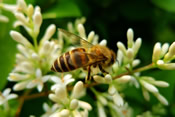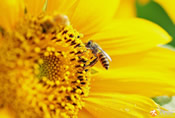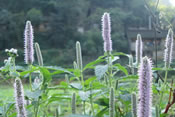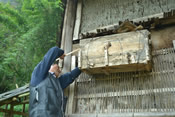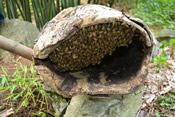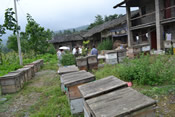| By / | Pan Yongrong (Programme Advisor for PCD Guizhou Programmes), and He Chengwen (Director and Research Associate, Institute of Modern Agriculture Development from the Guizhou Chinese Academy of Agricultural Sciences) |
| Photo by / | He Chengwen |
|
Editor's Note Mashan is a karst area of China's Guizhou province severely afflicted by soil denudation and ecological destruction. Conservation of the local Chinese honeybees is an important strategy in restoring the area's ecological health, because these insects are the main pollinators of native plant species and traditional crops. If the honeybees ever disappear, local crop production would decline and native wild plants would also disappear. The biological chain would be broken and the ongoing destruction of the local ecological system would accelerate. Unfortunately, in recent years, the population of local Chinese honeybees in the area has declined to such an extent that they are facing extinction. The causes are varied, but include the introduction by some farmers of European honeybees and the large-scale application of pesticides. To conserve Chinese honeybees, we have to first understand the beekeeping practices of local villagers and the relationship between such practices and the traditional way of life in Mashan. Only with this knowledge can the next step towards conservation be taken. Last August, a nine-month survey on beekeeping in Zongdi, a Miao township in Ziyun County, the hinterland of Mashan, started by PCD partners, with PCD support. The survey revealed interesting traditional beliefs and methods of beekeeping, imbued with wisdom on the mutualistic relationship between human beings, bees and nature. The survey also showed the negative impact of the blind pursuit of new technology and large-scale beekeeping. |

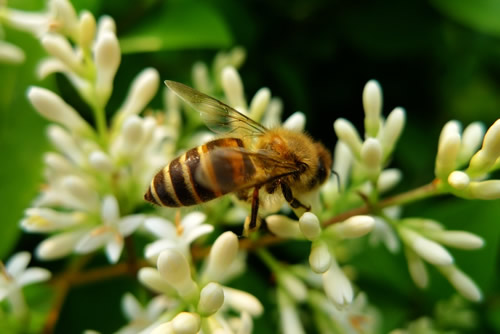 |
| Chinese honeybees are the main insect pollinators for local plant species and traditional crops of Mashan. |
Mashan is one of the poorest areas of Guizhou. In past times, it was famous for hemp production (which gave it its name).* Mashan is inhabited mainly by ethnic minorities, in particular the Miao and the Buyi people. The topography is marked by concentrated and continuous karst formations, with steep slopes and exposed limestone. The soil is poor and thin and there is little vegetation because of the relatively dry climate and lack of surface water. In short, the ecological system is highly vulnerable which has a big impact on life of local villagers.
In March 2011, with the support of PCD, the Institute of Modern Agriculture Development from the Guizhou Chinese Academy of Agricultural Sciences, Faculty of History and Culture of Jishou university of Hunan and Guizhou Institute of Prataculture launched a pilot programme on ecological restoration in the Mashan area. A survey on the current status of Chinese honeybee conservation was carried out as part of the programme, providing information about the local beekeepers' ecological outlook and related matters and giving us a direction for our approach to ecological restoration.
The survey found that more than a thousand hives are kept by the 22 villages of the township. There are beekeepers in every village. Some beekeepers have only one hive while others have more than 20. Nearly all of them keep honeybees in traditional ways.
Traditional beekeeping: bees go back and forth freely between natural and man-made homes
The Miao people of Mashan usually use wood barrels to keep bees while some use hives made of bamboo strips and covered with cow dung. The hives are hung up or placed in front of or behind the house, under the ceilings or fruit trees, next to cattle pens or in caves. The honeybees kept are mainly wild bees. There is a Miao saying that "pigs come to the poor, dogs go to the rich, and bees go to the populous and prosperous". The bees of most beekeepers came of their own accord. It is believed that a family will grow large and prosperous when bees come to the family, and that a family will decline when bees leave of their own accord. Worried that their bees might leave them, people give a lot of attention to looking after their bees, treating them as part of the family. They hang their beehives on the door or on the window, believing that beehives can guard the house and ward off evil spirits. When an elderly person passes away, the family not only dress themselves in mourning clothes, but also put them on their beehives, to stop the bees from leaving.
Some beekeepers go into the mountains to catch wild bees, looking for tell-tale piles of bee frass or following the bees' flight direction. When they find the bees, they capture them with a bamboo basket, bring them home and put them in a beehive. If the beehive suits the bees, they start to build a colony. If it doesn't suit them, they leave and become wild bees again. This life of 'wild bees—reared bees—wild bees' matches the characteristics of the normal life of honeybees—they will go where the environment suits them. They come and go and live in harmony with nature.
A more traditional method of beekeeping is to put up an ownership marker in the cave or on the tree trunk where one has discovered a colony. When other villagers see the sign, they honour the custom and do not catch the bees or steal the honey. To do so would be to invite censure. The owners of wild beehives usually only worry about wild animals stealing their honey. However they have ways to deal with this threat, such as taking their hunting dogs to urinate near the hive. The smell of the dog urine acts as a deterrent to wild animals.
Modern agriculture: a threat to the survival of Chinese honeybees
Modern agriculture has created a lot of problems for honeybees at Mashan. The increased use of chemical fertilisers, pesticides and herbicides has resulted in the die-off of many honeybees. Added to this problem is the gradual replacement of traditional mixed cropping by monoculture. In the past, to adjust to local environmental conditions and needs of everyday life, farmers grew many crop varieties, especially beans and vines. Now all these crops are replaced by one single crop—corn, and that means fewer nectar sources, affecting the survival of honeybees and the quality of their honey. A third problem is the threat of western honeybees imported from Italy. Some farmers in the area have started to keep these exotic bees, and beekeepers from outside have introduced hundreds of Italian beehives to Mashan. Not only do the exotic bees compete with the native bees for the limited nectar sources in the area, they also hunt and kill the native bees. While the Italian bees produce more honey, they do not pollinate local crops effectively because of their biological characteristics, and have become an invasive species in Mashan.
Technology comes to mind when thinking of ways to conserve Chinese honeybees. This is the experience of ecological agriculture programmes. A programme to study honeybee conservation is no different, and most partners in this programme have a background in agricultural studies. They are also excellent workers in agricultural technology. Thinking that they were helping the beekeepers, they started to promote modern beekeeping technology (such as movable frame hives) and tried to persuade local beekeepers to increase the scale of beekeeping.
Modern methods of beekeeping: increased but unsustainable production and income
Some farmers have given up traditional ways of beekeeping and have turned to movable frame hives in anticipation of gaining higher income. Over the last few years the price of honey has risen rapidly from 80 yuan/kg to 200 yuan/kg. Consequently, more farmers have become engaged in large-scale beekeeping in the hope of reaping gains from the price hike.
However, our experience in earlier programmes showed that economic motivations and application of modern technology are highly susceptible to market fluctuations, and a blow to villagers' enthusiasm can destroy the traditional industry overnight! We have therefore been discussing the issues of traditional technology and modernisation with our partners. While acknowledging that modern agricultural technology has helped farmers to increase production and income, we think that traditional technology should not be seen as backward. We believe that only when the two are integrated organically can they bring sustainable development to the local community.
Traditional beekeeping practices embody important cultural and ecological values
In the later part of the survey, more attention was paid to exploring and documenting traditional beekeeping technology and related culture. Exchanges on farmers' experiences were held for this purpose, with programme workers and beekeepers together exploring the values behind beekeeping. They found that apart from being a source of livelihood (economic value), beekeeping also embodies very rich cultural and ecological values.
According to local traditions, the purpose of beekeeping is, first, to harvest honey. In the words of the local people, it is to "eat sugar"; that is, to address the problem of lack of local production of sugar. Secondly, local people believe that honeybees bring good fortune, and keep them as pets in order to stay safe. Beekeeping is also seen as an activity that improves one's temperament and makes one feel happy and content. Thirdly, honey bees pollinate crops and plants, boosting farmers' harvests and ensuring that plants thrive. Fourthly, beekeepers are respected in the local community. They harvest honey once or twice at the end of spring and end of autumn, and always share it with their relatives, friends and neighbours, no matter how small the harvest. This helps to glue the community together.
"After taking up beekeeping, one becomes concerned with nectar sources and the environment."
"Before one keeps honeybees, one is never concerned with nectar sources; after one starts to keep honeybees, one becomes very concerned with nectar sources and the environment." This sums up the experience of beekeepers in Mashan. They believe that many Mashan villagers keep Chinese honeybees because there is a variety of nectar sources scattered around the area, such as pumpkins, beans, wild wrinkled giant hyssops, wild sweet osmanthus, wild chrysanthemum, kudzu, Chinese tallows, chestnuts, etc. When one wants to increase the scale of beekeeping, one should consider the capacity of the ecological environment. In Mashan, there are some traditional taboos in beekeeping, such as that a family should keep no more than nine beehives. If a family keeps more, the extra beehives have to be placed upside down. Also, only people born in earth or wood years can keep bees. These restrictions on beekeeping have some basis in reason. Villagers believe that such restrictions can prevent people from blindly expanding the scale of beekeeping and threatening the ecological environment. Yao Zhengrong of Tianba Village has inherited the beekeeping business of his forefathers. He used to give away the extra beehives to his brothers whenever the number of beehives he had increased to ten. However, none of his brothers were born in earth or wood years. Though they have received many beehives from Yao, they have never successfully reared any honeybees. Yao follows the traditions: he has over 20 beehives, all but nine of which are kept upside down. He is worried that if he did not do it this way, he would be violating the taboos. He does not know the meanings behind the taboos. He simply knows that the customs passed down by his forefathers work.
What sort of motivation ensures sustainable living?
There is a story about a villager who adopted the modern way of beekeeping. Yang Shibao, a villager of Wantang Village, had over 20 beehives when he turned to movable frame hives for the sake of easy cleaning, honey harvesting and splitting hives. Now nearly all his honeybees are gone! He often wonders whether it is because he has failed to master the modern technology or because the local bees dislike 'Western-style houses'—movable frame hives.
The above cases were shared when villagers recalled and discussed local traditions while discussing the multiple values of beekeeping. This process has increased villagers' confidence in traditional beekeeping technology and in the culture connected with beekeeping. Villagers have also become more aware of the need to restore the ecological environment. We and our partners reached a conclusion in our reflections during this process: "Only non-economic motivations are sustainable!"
*Translator's note: Ma in Chinese means "hemp" and shan means "mountain".




